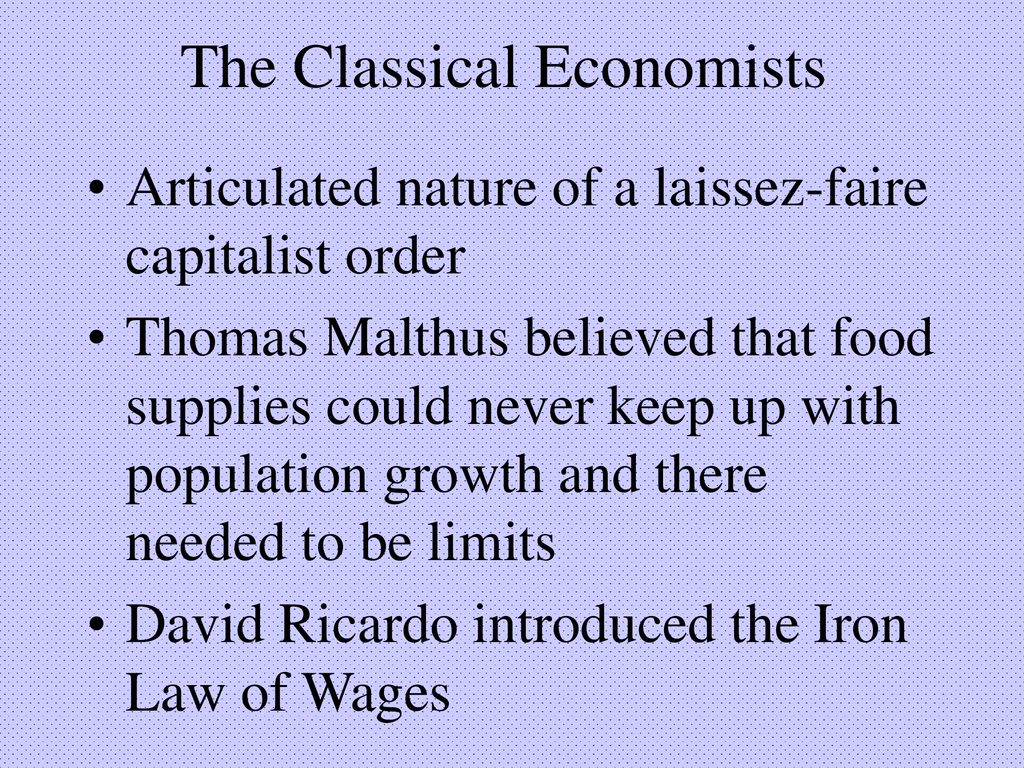Educated for the ministry, Malthus became perhaps the first professional economist in history; he was hired by the East India Company to teach its employees at a training school in England. In 1798 he published his Essay on Population, a dramatic warning that the human species would breed itself into starvation. In the Essay, Malthus formulated a series of natural laws:
The power of population is indefinitely greater than the power in earth to produce subsistence for man.
Population, when unchecked, increases in a geometrical ratio. Subsistence only increases in an arithmetical ratio.”
Misery and vice would spread, Malthus believed, because the unchecked increase in human numbers would lower the demand for labor and therefore lower the wages of labor. The reduction of the human birth rate was the only hope held out to suffering humanity. It was to be achieved by “moral restraint,” that is, by late marriage and by “chastity till that period arrives.”
Ricardo, too, was a prophet of gloom. He attributed economic activity to three main forces: rent, paid to the owners of great natural resources like farmland and mines; profit, accruing to enterprising individuals who exploited these resources; and wages, paid to the workers who performed the actual labor. Of the three, rent was the most important in the long run. Farms and mines would become depleted and exhausted, but their yield would continue in great demand. Rent, accordingly, would consume an ever-larger share of the “economic pie,” leaving smaller and smaller portions for profit and wages.
Ricardo did not believe that the size of the economic pie was necessarily fixed, and thus did not subscribe entirely to the mercantilist idea that the total wealth of humanity was severely limited, so that more for one person meant less for another. And yet he did predict eventual stagnation.
Whereas Adam Smith had cheerfully predicted an increasing division of labor accompanied by steadily rising wages, Ricardo brought labor and wages under the Malthusian formula. Ricardo’s disciples hardened this principle into the Iron Law of Wages, which bound workers to an unending cycle of high wages and large families, followed by an increase in the labor supply, a corresponding increase in competition for jobs, and an inevitable slump in wages.
The slump would lead workers to have fewer children, followed by a resulting shortage of labor and rising wages; then the whole cycle would begin again. Ricardo himself, however, regarded the cycle not as an Iron Law but simply as a probability. Unforeseen factors in the future might modify its course and might even permit a gradual improvement of the worker’s lot.
The classical economists were proved wrong. The size of the economic pie expanded far beyond the expectations of Ricardo, as did the portions allotted to rent, to profit, and to wages. Malthus did not foresee that scientific advances would make the output of agriculture expand at a nearly geometrical ratio. He did not foresee that the perils of increasing birth rates would sometimes be averted by contraception or by emigration.
Many millions of people moved from crowded Europe to lightly populated North America and Australia during the nineteenth century. The exodus from overcrowded Ireland, in particular, continued so briskly after the famine of the 1840s that by 1900 the Irish population was little more than half what it had been fifty years earlier.
Although the classical economists did not take sufficient account of the immense changes being worked by the agricultural and industrial revolutions, their laissez-faire liberalism won particular favor with the new industrial magnates. The captains of industry were perhaps disturbed by Ricardo’s prediction that profits would inevitably shrink; but they could take comfort from the theory that suffering and evil were “nature’s admonitions.” It was consoling to the rich to be told, in effect, that the poor deserved to be poor because they had indulged their appetites to excess.
The poor did not like to hear that they deserved to be poor. Working-class leaders attacked supporters of the classical economic doctrines for acting without heart and without conscience and for advancing economic theories that were only rationalizations of their own economic interests.

